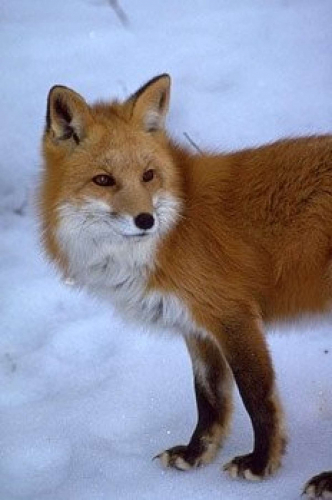From the Open-Publishing Calendar
From the Open-Publishing Newswire
Indybay Feature
Sierra Nevada Red Fox Population Gains Endangered Species Act Protection
SACRAMENTO, August 2, 2021 — In response to a petition and lawsuits from the Center for Biological Diversity, the U.S. Fish and Wildlife Service today granted endangered status to a population of one of North America’s rarest mammals, the Sierra Nevada red fox.
These secretive foxes live in remote, high mountains in the Sierra Nevada and Cascade ranges of California and Oregon. The Service is designating only the Sierra Nevada population, which ranges from Yosemite National Park to Kings Canyon National Park, as an endangered species under the Endangered Species Act even though the species occurs in the Cascades to Mt. Hood in Oregon, where the animals face the same threats.
“The Sierra Nevada red fox is a vanishing emblem of remote Sierra wilderness and a harbinger of climate change,” said Jeff Miller, a senior conservation advocate at the Center. “Endangered Species Act protections can give this adorable canine a fighting chance at survival and recovery. This is an important step, but the Fish and Wildlife Service should also protect these imperiled animals in the Cascades.”
The Center petitioned for protection of the red fox in 2011 and filed lawsuits in 2013 and 2019 to force the Service to decide on the animal’s protection.
The Sierra Nevada red fox once was found throughout the Sierra Nevada mountains, but populations have declined dramatically because of poisoning and trapping, habitat destruction from logging and livestock grazing, and disturbance from off-road vehicles and snowmobiles. Trapping the species is now banned in California.
Only one small, isolated population with an estimated 18 to 39 adults remains in the Sierras, mostly in and around Yosemite National Park.
Climate change is projected to dramatically shrink the Sierra Nevada red fox’s subalpine habitat as hotter and drier conditions push its range farther up mountain slopes. Climate change is reducing the Sierra snowpack, causing increased competition for food with coyotes. These foxes are jeopardized by inbreeding depression due to small population size and hybridization with nonnative red foxes.
Disturbance from humans, particularly from snowmobiles, is also a threat. Habituation of foxes to humans and human food sources may subject them to dog attacks, dog diseases and vehicle collisions.
Active mostly at night, Sierra Nevada red foxes spend winters in dens in earthen cavities in mature forest. They summer in high meadows, fell fields, talus slopes and shrub lands. They are adapted to cold and have particularly thick and deep winter coats and furry toe pads that help them to walk over snow. Their diet consists of rodents, small mammals, fruit, birds, insects and carrion. They are born into one of three color phases (red, black or cross) and are distinguishable from other native foxes by their black-backed ears and white-tipped tails.
Photo: Sierra Nevada red fox. Photo courtesy USDA
The Center for Biological Diversity is a national, nonprofit conservation organization with more than 1.7 million members and online activists dedicated to the protection of endangered species and wild places.
https://biologicaldiversity.org/w/news/press-releases/sierra-nevada-red-fox-population-gains-endangered-species-act-protection-2021-08-02/
“The Sierra Nevada red fox is a vanishing emblem of remote Sierra wilderness and a harbinger of climate change,” said Jeff Miller, a senior conservation advocate at the Center. “Endangered Species Act protections can give this adorable canine a fighting chance at survival and recovery. This is an important step, but the Fish and Wildlife Service should also protect these imperiled animals in the Cascades.”
The Center petitioned for protection of the red fox in 2011 and filed lawsuits in 2013 and 2019 to force the Service to decide on the animal’s protection.
The Sierra Nevada red fox once was found throughout the Sierra Nevada mountains, but populations have declined dramatically because of poisoning and trapping, habitat destruction from logging and livestock grazing, and disturbance from off-road vehicles and snowmobiles. Trapping the species is now banned in California.
Only one small, isolated population with an estimated 18 to 39 adults remains in the Sierras, mostly in and around Yosemite National Park.
Climate change is projected to dramatically shrink the Sierra Nevada red fox’s subalpine habitat as hotter and drier conditions push its range farther up mountain slopes. Climate change is reducing the Sierra snowpack, causing increased competition for food with coyotes. These foxes are jeopardized by inbreeding depression due to small population size and hybridization with nonnative red foxes.
Disturbance from humans, particularly from snowmobiles, is also a threat. Habituation of foxes to humans and human food sources may subject them to dog attacks, dog diseases and vehicle collisions.
Active mostly at night, Sierra Nevada red foxes spend winters in dens in earthen cavities in mature forest. They summer in high meadows, fell fields, talus slopes and shrub lands. They are adapted to cold and have particularly thick and deep winter coats and furry toe pads that help them to walk over snow. Their diet consists of rodents, small mammals, fruit, birds, insects and carrion. They are born into one of three color phases (red, black or cross) and are distinguishable from other native foxes by their black-backed ears and white-tipped tails.
Photo: Sierra Nevada red fox. Photo courtesy USDA
The Center for Biological Diversity is a national, nonprofit conservation organization with more than 1.7 million members and online activists dedicated to the protection of endangered species and wild places.
https://biologicaldiversity.org/w/news/press-releases/sierra-nevada-red-fox-population-gains-endangered-species-act-protection-2021-08-02/
Add Your Comments
We are 100% volunteer and depend on your participation to sustain our efforts!
Get Involved
If you'd like to help with maintaining or developing the website, contact us.
Publish
Publish your stories and upcoming events on Indybay.
Topics
More
Search Indybay's Archives
Advanced Search
►
▼
IMC Network



